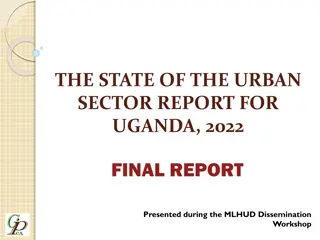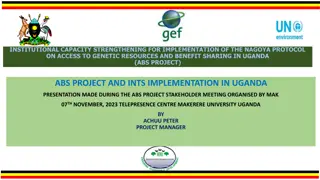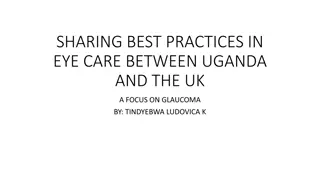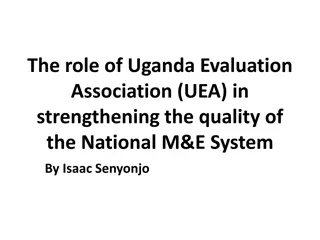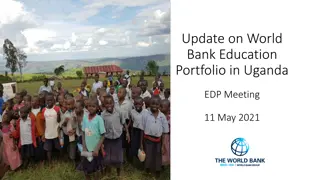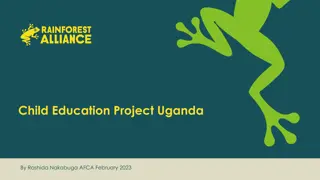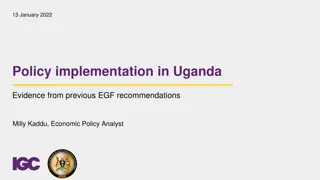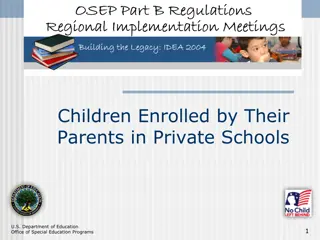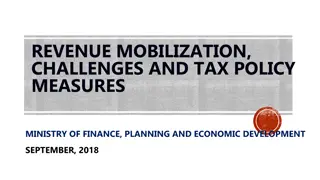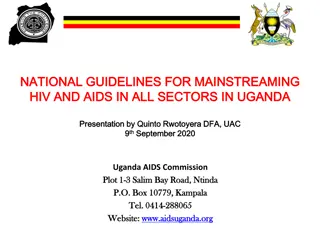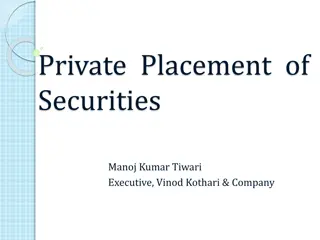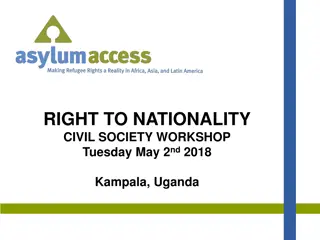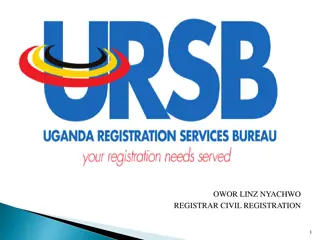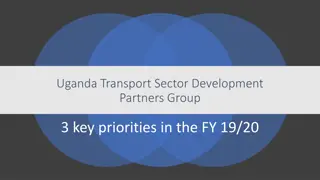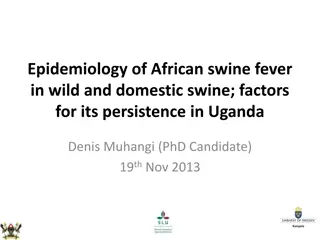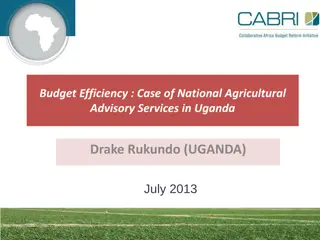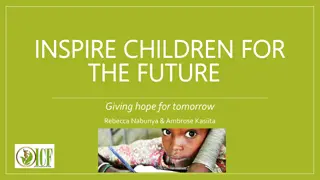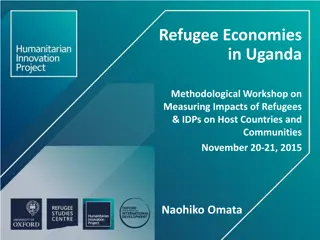Challenges and Solutions for Private Schools in Uganda
Private schools in Uganda face various challenges, particularly under the current COVID-19 situation. These challenges include financial strains, operational difficulties due to implementing SOPs, and repayment of high-interest loans. To address these concerns, innovative solutions are needed to ensure the sustainability and quality of education in private institutions.
Download Presentation

Please find below an Image/Link to download the presentation.
The content on the website is provided AS IS for your information and personal use only. It may not be sold, licensed, or shared on other websites without obtaining consent from the author. Download presentation by click this link. If you encounter any issues during the download, it is possible that the publisher has removed the file from their server.
E N D
Presentation Transcript
MINISTRY OF EDUCATION AND SPORTS MINISTRY OF EDUCATION AND SPORTS DEPARTMENT OF PRIVATE SCHOOLS AND INSTITUTIONS DEPARTMENT OF PRIVATE SCHOOLS AND INSTITUTIONS Status of Private Schools, Challenges and Way Forward By Edward K. Ssebukyu Commissioner Private Schools and Institutions
Contribution of Private Schools to Education Provision in Uganda Contribution of Private Schools to Education Provision in Uganda Table showing %age Share of Private Sector in Provision of Education in Uganda Level Ownership %age Private Enrolment by Number Enrolment by %age Primary Secondary 77% PPET (Source: The Master List: UBOS School Mapping Report, 2019) 65% 3,402,363 1,225,028 15,453 32% 62% 36% 62%
Categories of private schools Categories of private schools Four categories 1. Individual/Entrepreneur/proprietor(s) owned private schools. These are for- profit and are owned by an individual, group of individuals or by a business entity. 2. Community owned private schools. These are usually established by parents at the village level seeking to fill a dire access gap and are mainly not-for-profit. Majority schools are established in communities where there are no Government schools with the hope that the Government will eventually takeover or support by grant-aiding. 3. The Faith Based (Catholic Church, Church of Uganda, Islam, SDA and Orthodox Church) are (major founders and operators). 4. NGO s/ CSO founded such as World Vision, Safe the Children, PEAS, etc. Even among the schools reported as Government schools, the majority are non- state founded and operate under a loose form of Public Private Partnership (PPP) through what is called Government grant-aiding.
Status of Private Schools Under Covid Status of Private Schools Under Covid- -19 The majority of private primary and secondary schools in Uganda are low cost and founded either by communities, where there is limited access to government founded schools, or by individual entrepreneurs. These schools rely entirely on school fees to operate. They are, therefore, very vulnerable to disruptions that result in school closures and have been hit hard by prolonged closure due to Covid-19. When education institutions reopen under the strict Covid-19 SOPs, private schools will be faced with a triple challenge. The operational costs have increased due to the requirement to implement the SOPs; Many parents may not be able to pay schools fees as before because of financial constraints caused by the lockdowns; A substantial number of private education institutions are saddled by high interest commercial loans acquired for infrastructure development 19
Challenges Faced by Private Schools Challenges Faced by Private Schools Majority private schools have Lost capacity to resume normal operations due to the following challenges: Inadequate financial reserves to acquire the necessary equipment and facilities for implementation of Covid-19 SOPs, Collapsing physical infrastructure, requiring major repairs and renovation Lost staff due to inability to maintain them on payroll during school closures Uncertainty regarding return of learners, when schools reopen, and ability of parents to meet school charges due to Covid-19 Inability to address the anticipated psychosocial challenges arising from Covid-19 impact. Repayment of commercial bank loans acquired for capital development
The Appeal of Private School Owners has been on four issues: Government should prevail upon commercial banks to reschedule loans held by education institutions for another year and consider bailing out some institutions with non-performing loans, Extension of financial support to private education institutions to acquire the facilities for implementation of the Covid-19 SOPs Setting up a revolving Education Recovery Fund (ERF) at low interest rates, to cushion private education institutions against the financial impact of Covid-19 and Setting up an Education Stabilization Fund (ESF) to serve as a long term backstop against severe impact on the sector.
Government Support to Private Schools Government Support to Private Schools There have been some efforts by Government to support private schools, namely: a. Prevailing on commercial banks to reschedule loan repayments for private schools and to prevent foreclosures b. The Presidential Grant of Ugx 20 billion to SACCOs of teachers in private schools c. Provision of home-study materials to learners in private schools d. Private schools will be provided with textbooks for rollout of the reformed lower secondary curriculum Clearly, more needs to be done to support private schools for safe re-opening and recovery in the short and medium terms. Unfortunately, the impact of Covid-19 on the national economy means that the government may not be in position to provide the needed financial rescue package to private education institutions. According to the World Bank, Covid-19 shock caused a sharp contraction of Uganda s economy to its slowest pace in three decades
Private Schools Need Support in the Following Key Areas Private Schools Need Support in the Following Key Areas Safe Reopening Under Covid-19 SOPs, To be able to reopen and effectively implement Covid-19 SOPs, the low cost private schools require support to acquire facilities such as: temperature guns, soap, foot operated hand washing facilities, water tanks, and disinfectants. To Promote Safe and Secure Learning Environment; Private schools need support with school repairs and maintenance. Basic equipment and facilities such as cutlasses, hoes, pangas, rakes, sprays pumps, insecticides, and paint are critical for keeping a safe and secure learning environment, given the deterioration that schools compounds have seen through prolonged closure. Without the support, the cost for these items will be passed down to parents, increasing the cost of education and resulting in exclusion from education access for some children. To Promote Quality in Education Provision; Private schools, especially at secondary level, require support to acquire laboratory equipment and facilities to strengthen the teaching of science; For psychosocial support, teachers in private schools need to be trained and availed support materials for guidance and counseling of learners to cope with the new challenges under Covid-19;
Conclusion Conclusion Private Schools require urgent support from both Government and development partners in order to be ready for safe reopening and sustainable operations, if they have to effectively play their complimentary role in education provision. However, not all private schools need the support or are strategically important to qualify for support. Some private schools charge relatively high fees and are competitive enough to access finances for reopening. Others are located where they are not needed; for example; there are private schools in the vicinity of well established, equipped and well staffed Government aided schools that are not fully enrolled. A quick study may be necessary to determine the private schools that qualify for strategic support, for example, private schools in areas where there are no Government schools. We look forward for deeper engagement on this issue





